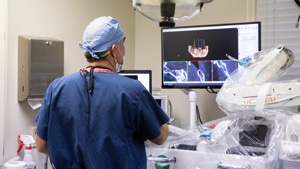A new technique, called Yomi, is now available to Cornerstone Dental Arts patients. Dr. Griffin has been specially trained to perform this robot-guided dental implant surgery.
Cornerstone Dental Arts offers dental implants to help you maintain your quality of life when you have lost one or more teeth. We’ll review your medical and dental history to see if Yomi robot-assisted surgery is a good option for you versus our traditional surgical technique for placing your implants.

